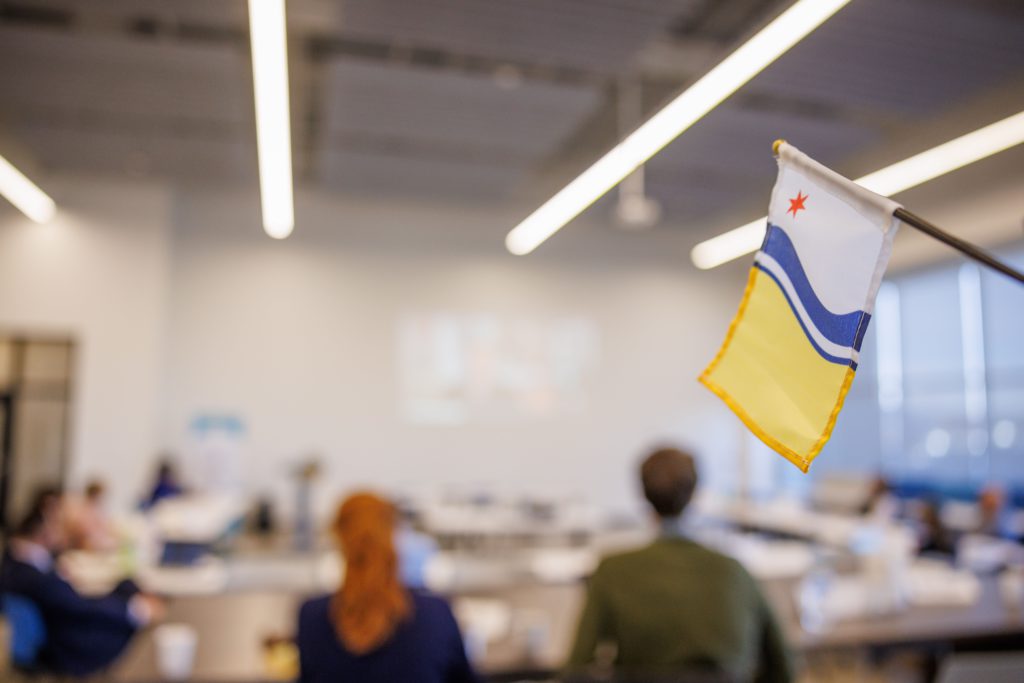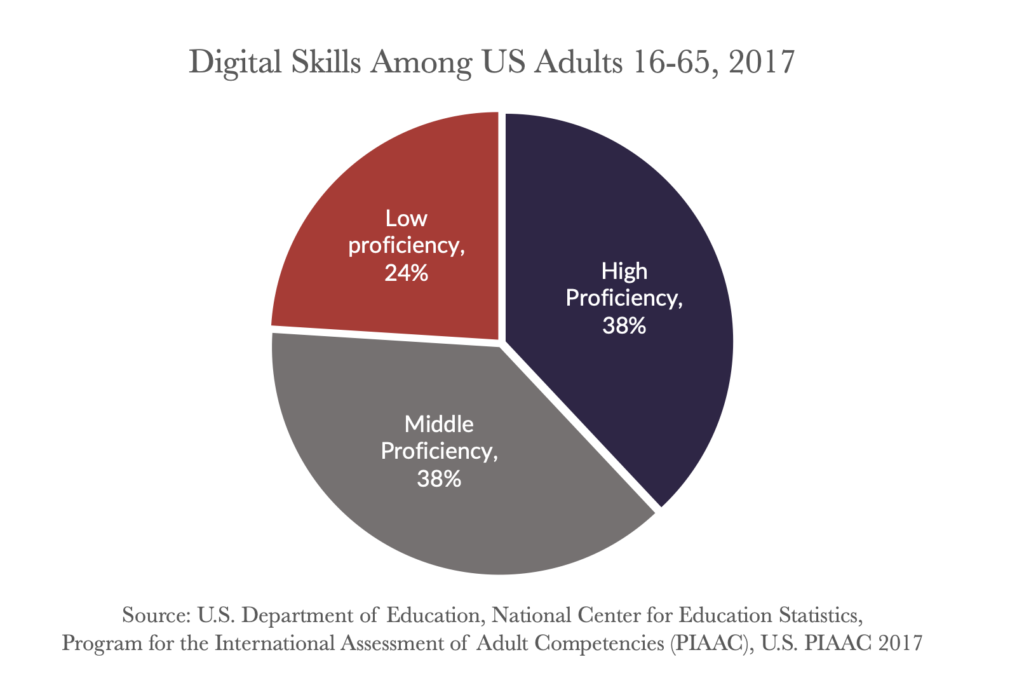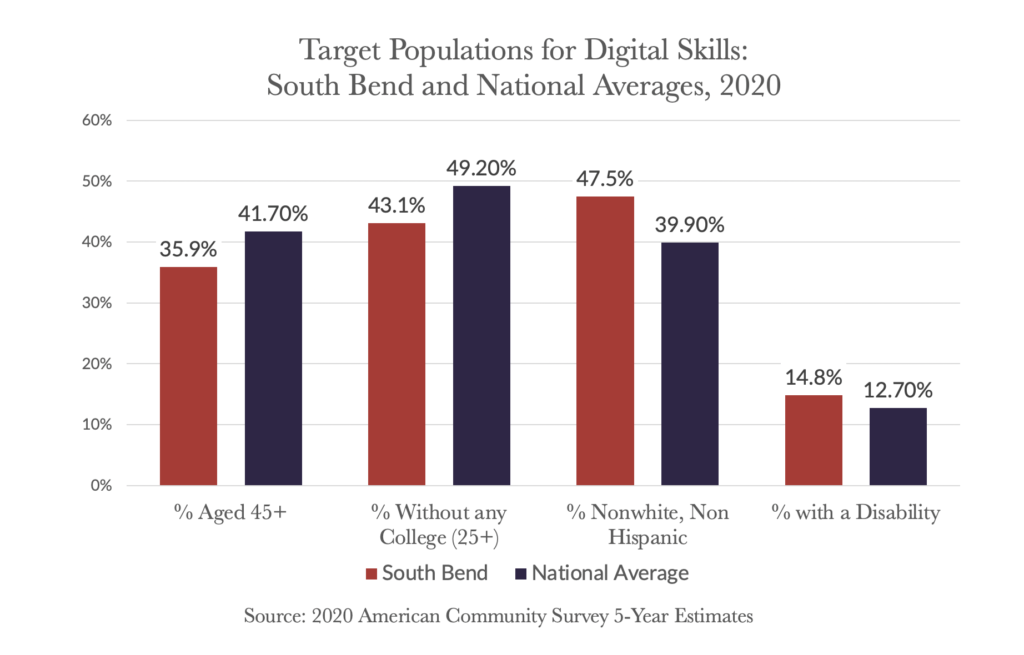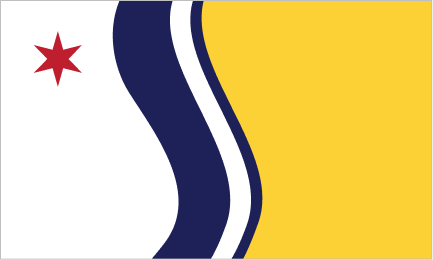
Even if residents can get online with an internet connection and a device, they may not have the skills or understanding necessary to fully participate in the digital world. These digital skills, according to the American Library Association, encompass the ability to use information and communication technologies to find, evaluate, create, and communicate information, requiring both cognitive and technical skills.
If residents aren’t familiar with operating systems, file organization, safe internet practices, work-related programs, internet browsing, e-mail, or social media, they are greatly limited in how they can use the internet to learn, connect, and grow. Without this familiarity, residents may also not know what they can gain from digital resources, contributing to disinterest in broadband service or a device. To bridge the digital divide in our community, promoting digital skills is essential.
South Bend’s Current State:
Statistics on digital skills are limited at the local level. To date, there are no questions in the Census or in regular community-level surveys about residents’ knowledge and comfort using digital tools and resources. This is a challenge we are working to address with new outreach and surveys in our community.
In the meantime, however, we can learn about the need for digital skills programs in South Bend by exploring national data and how it might relate to our current state.

In 2017, the US Department of Education found in skills assessments that 24% of US adults have low proficiency in “digital problem solving skills.” This means that 24% of adults are unable to complete basic tasks with the widest-used digital applications (like e-mail or web browsing).
38% of adults were found to have middle proficiency, meaning they could complete and understand simple tasks with basic applications, but could not complete more complex tasks (including navigating across pages, handling multi-step processes, or filling out forms) on those applications.
Only 38% of adults successfully completed these more complex tasks, meaning they had (for the purpose of this study) high proficiency. These findings reveal a critical need for digital skills training in the United States at a broad level.
In this study, the Department of Education also reports that key groups are significantly more likely to need digital skills resources, including adults aged 45 and older, people of color, those without education beyond a high school degree, and those with disabilities. As we work to promote digital equity, it is critical that we target our efforts to serve these communities.
Focusing on these target populations, we see that South Bend has a slightly younger population and slightly more college-educated population than the national average. However, we have a more diverse population and a slightly higher percent of residents with disabilities.
On the whole, these numbers may suggest that our need for digital skills training may be comparable to other communities across the country, with slightly greater needs for communities of color and those with disabilities.

Digital Skills Goals:
Most recent updates: July 2023
- Survey 300 residents in the first citywide Digital Literacy Survey with published estimates on digital skills proficiency by the end of 2022.
- Complete! See below for updates.
- Host a minimum of 20 events per year deepening residents’ digital skills at the South Bend Technology Resource Center through 2025.
- Explore philanthropic and ongoing grantmaking models to sustain digital skills programming for community partners.
- The City has supported a new partnership between La Casa de Amistad and the St. Joe County Public Library to provide digital skills training to the community. See updates below.
- Capitalizing on federal funding opportunities, pilot a digital navigator program using the City’s Outreach Team to help residents access online resources and learn digital skills around the community by 2024.
- South Bend has been awarded $193,000 to promote the Affordable Connectivity Program through digital navigators. See updates below.
What we’re doing now:
To reach these goals, we are engaged in projects and making commitments listed below. Please refer to this page often for updates as our efforts progress and we launch new initiatives.
Digital Skills Programming at the Technology Resource Center
- In addition to providing residents with free high-speed internet and devices for public use, the Technology Resource Center is the City’s home for digital skills training.
- In the past year, the City and enFocus have hosted more than 35 events at the Technology Resource Center. Many of these events focus on deepening residents’ comfort and skills with tools like spreadsheets, design software, surveys, and government data. The space is also open to community partners looking to promote digital skills or technology access.
- Click here to learn more about the Technology Resource Center and visit the TRC Eventbrite page to explore upcoming programming!
Surveying Residents’ Digital Skills (Updated July 2023)
- To address the limited availability of local data on digital skills and better understand the needs of our residents, we have launched South Bend’s first Digital Literacy Survey.
- In addition to the above online form, residents (especially those without internet access) could complete paper surveys at every St. Joe County Public Library location, as well as in community centers throughout South Bend.
- 10 survey respondents will receive a $50 Martin’s gift card, and results will be shared soon!
Update, March 2023: Results from South Bend’s first citywide Digital Literacy Survey have been published on the Open Data Portal! Read some high-level takeaways from our team. A dashboard of the results is forthcoming.
Update, July 2023: We have published a full dashboard of insights from the Digital Literacy Survey, as well as a Medium blog explaining our process and the results.
Exploring models to sustain digital skills programming
Exploring a Digital Navigator Model (Updated March 2023)
- Digital navigators, individuals who walk with residents through the different steps in the process of getting online, can be critical in promoting digital equity in a community.
- Currently, the City of South Bend Outreach Team works to connect residents with local, state, and federal resources or assistance programs. As the Outreach Team engages with residents, they help them navigate available resources with a holistic approach to access.
- By 2023, we plan to leverage the Outreach Team to serve as digital navigators for residents, helping them access digital resources and learn digital skills.
Update, March 2023: South Bend has won $193,000 in federal grant funding to promote the Affordable Connectivity Program through digital navigators. As we consider how we can best implement digital navigators in South Bend, we will learn from this use case.
Supporting our Partners (Updated July 2023)
- Especially as residents look to trusted community organizations for resources, we are eager to leverage the work of our partners to promote digital skills training.
- The St. Joe County Public Library (SJCPL), with 9 locations in South Bend, offers assistance with digital tasks and is exploring new digital skills training programs with community organizations.
- Bendable, a free online learning resource offered through the library, helps residents learn about a variety of topics from local and national sources. Bendable provides free courses on basic computer and internet use, as well as over 100 additional topics like presentation software, safe practices online, and many more.
- Especially as new funding becomes available for digital equity programming, we will work with community partners to explore how the City can best support and sustain their digital skills programming.
Update, July 2023: In June of 2023, we supported the first cohort of a new partnership between La Casa de Amistad and SJCPL to offer digital skills training to the South Bend community. Participants who attended 12 computer classes received a refurbished desktop station donated by the City at the first cohort’s graduation ceremony.
Continue to explore our Digital Equity Roadmap below for additional initiatives and resident resources!
